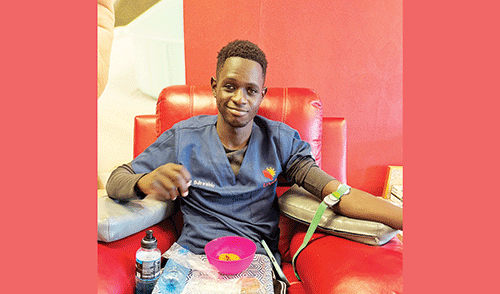ONGWEDIVA – The Field Recruiter of the Blood Transfusion Service of Namibia (NamBTS), Adolph Mwafangeo, said the blood shortage situation has improved over the past month.
Mwafangeo made this statement recently when he was speaking to New Era.
He stated that, compared to last December, more people have shown up in large numbers to donate blood since the beginning of this year.
Last year, the NamBTS had called for urgent blood donations from Namibians to address critical shortages during the festive season.
He expressed gratitude to the nation for their continued commitment to donating blood at various centres.
The centre at Oshakati Intermediate Hospital operates every Monday from 10h00 to 18h00.
He urged people to continue donating blood, emphasising that it saves lives for patients in need.
“NamBTS will ensure that blood is provided to patients in hospitals who need it to be saved,” he added.
Mwafangeo also highlighted that donated blood helps people with various conditions such as cancer, those who have lost blood in car accidents, patients undergoing surgery, and mothers during childbirth.
He encouraged people to continue educating one another and sharing information about the importance of blood donation.
Student nurse at the University of Namibia Prince Buiswalelo (23) has pleaded with eligible donors to do their part and donate blood to save lives.
“The facility for donation opens early and closes late, so I am urging everyone who can donate to come and do so. This is about saving lives,” he said.
A challenge is that blood demand increases with motor-vehicle accidents on the roads as people travel to and from their destinations.
“Additionally, cancer patients continue with their treatment during the holidays and babies continue to be born, with some babies and mothers requiring a life-saving transfusion,” stated NamBTS.
During December 2024, blood stock levels were the lowest since 2020, with only a mere five-day bloodstock, a drastic situation that created a severe and worrying blood shortage.
The World Health Organisation (WHO) has reiterated the importance and need for citizens to donate blood and aid institutions like NamBTS to continue doing their work of saving lives.
“Blood is needed by women with complications during pregnancy and childbirth, children with severe anaemia, often resulting from malaria or malnutrition, accident victims, and surgical and cancer patients,” said the organisation.
WHO adds that while the need for blood is universal, access to blood is not, and blood shortages are acute in low- and middle-income countries like Namibia.
“Regular blood donation by a sufficient number of healthy people is needed to ensure that blood will always be available whenever and wherever it is needed,” read a statement by WHO. fhamalwa@nepc.com.na



